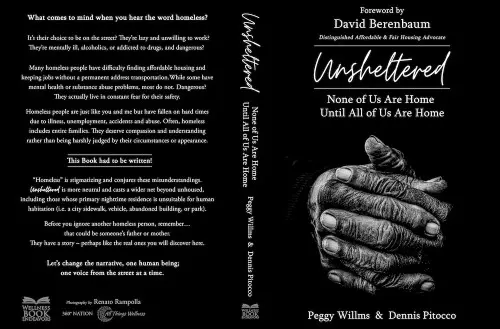HOMELESSNESS: Time to Debunk the Myths?
“The biggest misconception about the homeless is that they got themselves in the mess — let them get themselves out.” –Ron Hall
Myths are widely held thoughts or beliefs that are not generally true. Beyond just being misinformation, myths often create negative attitudes and even prejudice. This is most often the case when it comes to understanding homelessness. It’s time to debunk the myths.
MYTH: People are homeless by choice. FACT: People are homeless for a wide variety of reasons, a good number of which are at least partly and often mainly beyond a person’s control. Homelessness occurs when people or households are unable to acquire and/or maintain housing. Two significant factors that account for homelessness are the lack of jobs that pay a living wage and the lack of affordable housing. Additionally, people lose jobs and then housing. Women run away to the street to escape domestic violence. Many people have experienced significant Trauma and cannot cope with life. Others struggle with mental illness, Depression, or post-traumatic Stress. Yes, poor choices can contribute to homelessness. But outside circumstances strongly influence those choices.
MYTH: If people experiencing homelessness wanted to, they could pull themselves out of it. FACT: Once an individual or family loses their home, getting back into housing can feel nearly impossible. Most people lose housing because of financial situations – they simply do not have enough Money to provide housing for themselves/their families. Many because of job loss and/or underemployment. Imagine trying to get a job when you have no address to put on a resume, no phone number, no shower, and no clean-pressed clothes. Often, things like physical, mental, and emotional health, lack of transportation, and legal issues, hinder progress even more.
MYTH: Most people experiencing homelessness are addicted to drugs or alcohol. FACT: While many people experiencing homelessness do report having a substance abuse issue, most report that the addiction occurred AFTER they became homeless and was not the cause of their homelessness. Often, people experiencing homelessness turn to alcohol or drugs to dull the realities that come with living on the street.
MYTH: People experiencing homelessness need to “just get a job”. FACT: Getting a job is a challenge for most people these days and incredibly difficult for homeless people. Most lack clean clothes, showers, transportation, a permanent address, and a phone number. Others have a criminal past, learning disabilities, and a lack of Education that holds them down. Others have a source of income through Employment, disability, and/or VA benefits; however, their income is insufficient to afford housing. Thus, even if a homeless person can find work, their low income often cannot sustain them.
MYTH: People experiencing homelessness are dangerous. FACT: Homelessness is often associated with drugs, alcohol, violence, and crime. Life on the streets can be perilous for homeless men and women, but very few crimes are committed by people experiencing homelessness against those of us who try to help them.
MYTH: People experiencing homelessness are lazy. FACT: Surviving on the street takes more work than we realize. Homeless men and women are often Sleep-deprived, cold, wet, and sick. Their minds, hearts, and bodies are exhausted. With no transportation and little money, they can spend all day getting to food and maybe an appointment before they need to search for a safe place to sleep, all while trying to keep their personal possessions safe. It is not a life of ease.
MYTH: Homelessness will never happen to me. FACT: People experiencing homelessness never intended or expected to become homeless. They never thought they would become homeless. They’ve had solid jobs, houses, and families. But at some point, life fell apart. Even people on relatively sound financial footing are not immune to a series of unfortunate events leading to homelessness.
MYTH: Providing food and shelter only enables people to remain homeless. FACT: Food and shelter are essentials for life. We build Relationships with people in need by offering these and other outreach services, like restrooms and mail service. Then we’re able to offer them something more through our recovery programs, like counseling, addiction recovery, emotional healing, spiritual guidance, education, life skills, and job training.
Let’s change the narrative, starting with the word “Homeless” which is stigmatizing and conjures up misconceptions while carrying a negative connotation. “Unsheltered” is more neutral, and casts a wider net beyond unhoused, including those whose primary nighttime residence is unsuitable for human habitation (i.e., a city sidewalk, vehicle, abandoned building, or park).
It’s time for real stories to be told by the unsheltered and by those who can speak about and for them so we can debunk the myths “for good”…
—WORLDWIDE CALL FOR SUBMISSIONS—

CLICK FOR PRESS RELEASE ► Breakthrough Unsheltered Anthology Book Series Launched
WE NEED STORYTELLERS, including:
- those who; are currently unsheltered/homeless; have been unsheltered/homeless in the past
- those who have been affected indirectly/a degree removed from being unsheltered/homeless (family members, friends, co-workers, etc. .)
- those who are familiar with the personal and global effects of the unsheltered/homeless population,
- organizations and causes who are on the ground facing daily struggles with those who are unsheltered/homeless and who have stories to tell.
Originally Published on https://www.bizcatalyst360.com/author/dennisjpitocco/
























